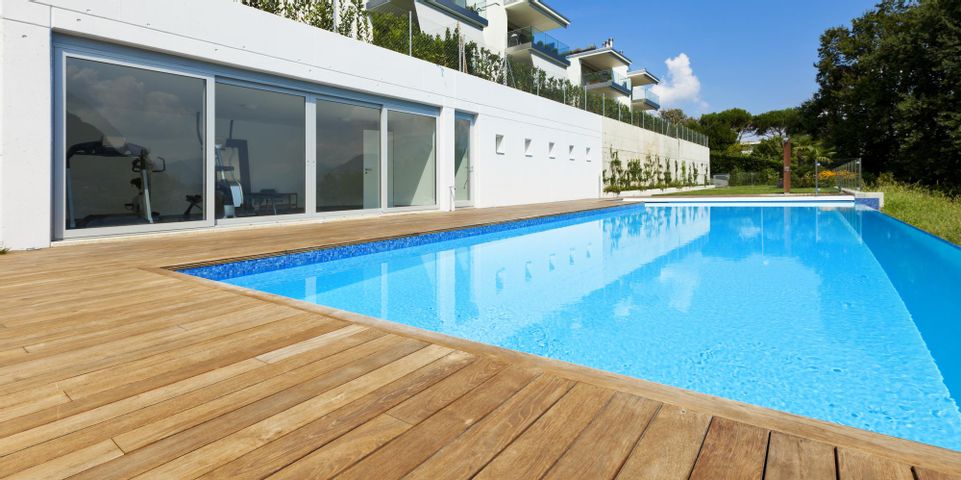Should I Use Saltwater or Chlorine for My Pool?

For as long as they’ve been around, swimming pools have been sanitized with chlorine, which is popular for its reliability, simplicity, and lower installation costs. But an increasingly popular alternative is saltwater, especially among pool owners who want to reduce the number of chemicals in their water. Each option has several advantages, so learn more about which one is right for you with the following guide.
Saltwater
 Saltwater swimming pools still contain chlorine, but the key difference is the mixture. In a saltwater system, chlorine is slowly released into the pool while the water is sanitized with a saltwater generator, which breaks the salt down with electricity.
Saltwater swimming pools still contain chlorine, but the key difference is the mixture. In a saltwater system, chlorine is slowly released into the pool while the water is sanitized with a saltwater generator, which breaks the salt down with electricity.
One of the chief advantages of saltwater is that it’s easier and less expensive to maintain. The reduced dependence on chemicals and the automated salination process can significantly cut time spent on upkeep. Additionally, the lower chlorine levels can be gentler on swimmers’ skin, while the salt itself doesn’t require the same cautious handling and storage that chlorine does.
However, a saltwater pool is a long-term commitment. The generator is likely to drive up utility costs, making it a poor investment unless maintained for a long time to average the cost. Salt is also known for its tendency to wear down equipment, including metal fixtures and lights, and the specialized equipment is likely to require professional repairs from time to time.
Chlorine
Chlorine remains the most widespread and economical form of swimming pool, favored for the low cost of the chlorine, option to make repairs without paying a professional, and smaller utility bills.
Chlorine has been in use for decades, making it widely available and the knowledge of its proper use easy to gain. It’s remained so popular because it’s known to be the most effective substance in neutralizing bacteria and contaminants for the lowest cost. For DIY enthusiasts, it’s easier to chlorinate and repair your pool by using this disinfectant.
Unfortunately, there’s no denying that chlorine is a harsh chemical that can irritate or even damage the skin, hair, and eyes. In excessive concentrations, chlorine can strip away sebum—the outer layer of oils that protects skin and hair—leaving a dry, itchy feeling. It can similarly affect the moisture in eyes, prompting redness, tearing, and itching. Those with chlorinated pools should follow strict guidelines to ensure the level of chlorine in the water is neither excessive nor dangerous.
When you’re ready to make summers brilliant with a home pool, turn to Aquarian Pools & Spas of Loveland, OH. These professionals offer a wide range of installation and maintenance services for saltwater and chlorine pool systems, backed by almost 40 years of experience and cutting-edge knowledge. To get started, call (513) 576-9771 or view their photo gallery online.
About the Business
Have a question? Ask the experts!
Send your question

